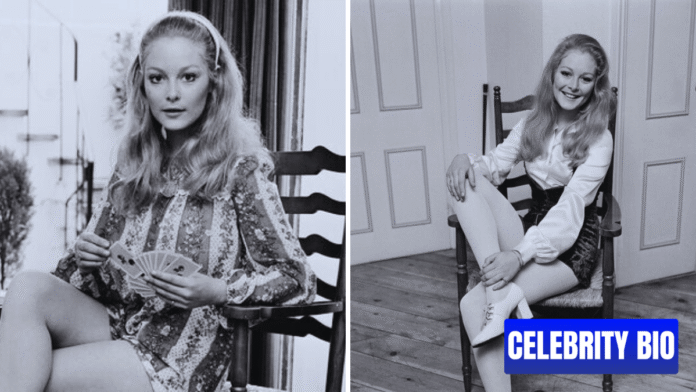Introduction
Jenny Hanley is one of those names that instantly evokes nostalgia for a golden era of British entertainment. Known for her elegance, warmth, and adaptability, she managed to carve out a career that spanned multiple decades and platforms. From acting in cult-classic films and becoming a Bond girl to co-hosting Magpie—the ITV children’s show that rivalled Blue Peter—Jenny Hanley’s career illustrates both the glamour and resilience of British showbusiness.
What makes her story so compelling is not just the roles she played, but the way she adapted to the ever-changing media landscape. While many of her contemporaries faded from the limelight after their film or television peaks, Jenny managed to reinvent herself repeatedly—acting, presenting, and finally thriving on radio.
In this in-depth article, we’ll explore every stage of Jenny Hanley’s life and career: her family background, her breakthrough in film, her role in On Her Majesty’s Secret Service, her cult status in Hammer horror films, her television stardom on Magpie, and her later career in radio. We’ll also examine her influence compared to other stars of her generation, share interesting facts, and answer FAQs that fans continue to ask about her.
Early Life and Family Roots
Jenny Hanley was born on 15 August 1947 in Gerrards Cross, Buckinghamshire, into a family where showbusiness was practically in the blood. Her father, Jimmy Hanley, was a popular actor in British cinema, appearing in classics such as The Blue Lamp (1950). Her mother, Dinah Sheridan, also enjoyed a successful acting career, particularly remembered for her roles in Genevieve (1953) and The Railway Children (1970).
Growing up in such a household, Jenny was immersed in the world of performance and media from an early age. It wasn’t unusual for film scripts and production stories to be part of everyday family conversation. This early exposure gave her both a love of the industry and an understanding of its challenges.
Jenny’s education was fairly traditional, but she always showed an artistic streak. Unlike some children of actors who deliberately avoided the limelight, Jenny leaned into it, inspired by her parents’ success but determined to make her own mark.
Jenny Hanley’s Breakthrough in Film
Jenny Hanley’s entry into film came at a time when British cinema was undergoing significant transformation. The late 1960s and early 1970s saw a mix of gritty social dramas, experimental works, and, of course, the continuing dominance of global franchises like James Bond.
A Bond Girl’s Spotlight
Her most internationally recognised role came in On Her Majesty’s Secret Service (1969). Playing one of Blofeld’s “Angels of Death,” she joined a glamorous roster of women who had appeared in the franchise. Although her role was not a leading one, the Bond series had such immense global reach that even minor appearances gave actresses lasting visibility.
Being a Bond girl came with both opportunities and typecasting risks. For Jenny, it was a career-defining moment, one that she embraced while also seeking roles that showed her versatility.
Hammer Horror and Cult Status
Another significant chapter in Jenny’s acting career was her work with Hammer Films, the production house that became synonymous with Gothic horror. She appeared in Scars of Dracula (1970), alongside Christopher Lee, one of the most iconic horror actors of all time.
Why Hammer Horror Mattered
Hammer films had a particular cultural impact. They weren’t just low-budget horror flicks; they were stylish, atmospheric, and filled with British actors who would go on to become legends. Jenny’s appearance in Scars of Dracula not only gave her cult status among horror fans but also demonstrated her ability to thrive in different genres.
For fans of Gothic cinema, Jenny Hanley remains a beloved name—her combination of beauty, poise, and subtle intensity made her a perfect fit for Hammer’s eerie yet glamorous style.
The Leap to Television: Magpie
While film gave Jenny international recognition, television made her a household name in Britain.
A Rival to Blue Peter
In 1970, Jenny joined Magpie, ITV’s answer to the BBC’s Blue Peter. While Blue Peter was traditional, wholesome, and somewhat conservative, Magpie positioned itself as more modern, edgy, and in tune with contemporary youth culture.
Jenny, with her approachable personality and warmth, became a natural fit for the programme. Alongside presenters such as Mick Robertson and Tommy Boyd, she helped define the show’s tone, which combined educational content with fun and adventure.
Why Magpie Stood Out
- Youth culture appeal: It connected with children who wanted something cooler and less formal than Blue Peter.
- Dynamic presenting team: Jenny’s balance of charm and authority made her stand out.
- Engagement: The show encouraged viewer interaction, a relatively new concept at the time.
Jenny’s time on Magpie (1970–1974) remains one of the most memorable parts of her career. She connected with an entire generation of British children, many of whom still fondly recall her today.
Later Television and Radio Career
After leaving Magpie, Jenny continued to appear on television, but she increasingly found her voice in radio. Over the years, she worked as a presenter and host across different stations, with her warm and engaging style making her popular among listeners.
Radio’s Intimacy
Radio allowed Jenny to connect with audiences in a way television sometimes couldn’t. Her voice became her trademark—calm, reassuring, and intelligent. She hosted interviews, discussed cultural issues, and proved that her talent wasn’t limited to on-screen presence.
This phase of her career demonstrated her adaptability. Where others might have struggled to stay relevant, Jenny thrived by reinventing herself as a broadcaster.
Jenny Hanley Compared to Her Contemporaries
The late 1960s and 1970s produced a wealth of glamorous British actresses and presenters. Jenny Hanley shared the stage with names like Valerie Leon, Joanna Lumley, and Madeline Smith.
- Valerie Leon became iconic through her roles in Carry On films and Hammer horror.
- Joanna Lumley went on to massive fame with Absolutely Fabulous.
- Madeline Smith became another cult horror star.
What set Jenny apart was her successful transition into children’s television and radio. While many of her contemporaries remained fixed in one genre, Jenny diversified, ensuring she wasn’t pigeonholed.
Jenny Hanley’s Legacy in British Entertainment
Jenny Hanley’s enduring appeal lies in her versatility. She is remembered as:
- A Bond girl, securing her place in cinematic history.
- A Hammer horror actress, beloved by cult film fans.
- A Magpie presenter, cherished by a generation of children.
- A radio broadcaster, respected for her voice and intellect.
This combination makes her one of the rare figures in British entertainment to bridge multiple cultural spheres—cinema, children’s television, cult fandom, and mainstream broadcasting.
Interesting Facts About Jenny Hanley
- She came from a family of actors—both parents were in the business.
- Her Bond girl appearance ensured international recognition.
- She became an icon of Hammer horror in the 1970s.
- Jenny was one of the longest-serving presenters on Magpie.
- She later reinvented herself as a radio host.
- Despite her glamorous roles, she has often been praised for her grounded and approachable personality.
FAQs
What is Jenny Hanley best known for?
She is best known for presenting Magpie and for her roles in On Her Majesty’s Secret Service and Scars of Dracula.
Was Jenny Hanley related to other famous actors?
Yes, her father was actor Jimmy Hanley and her mother was Dinah Sheridan.
How long was Jenny Hanley on Magpie?
She presented the show from 1970 to 1974.
Did Jenny Hanley continue acting after Magpie?
Yes, she continued acting sporadically but increasingly focused on radio and presenting.
Is Jenny Hanley still alive?
Yes, Jenny Hanley remains a cherished figure and occasionally makes public appearances.
Why is she considered a cult figure?
Her Bond and Hammer horror roles gave her cult status among fans of 1970s British cinema.
How did Magpie differ from Blue Peter?
Magpie was seen as more modern and edgy, aimed at children who wanted something cooler than the BBC’s more traditional offering.
Conclusion
Jenny Hanley’s career is a fascinating study in adaptability, resilience, and charm. She could have remained simply “a Bond girl” or a Hammer horror actress, but she went further, making herself a household name through Magpie and later establishing herself as a respected broadcaster on radio.
Her story is a reminder that success in entertainment is not just about one role or one era—it’s about evolving with the times, seizing opportunities, and staying connected with audiences. Jenny Hanley achieved all of this with grace, making her a timeless icon of British culture.

